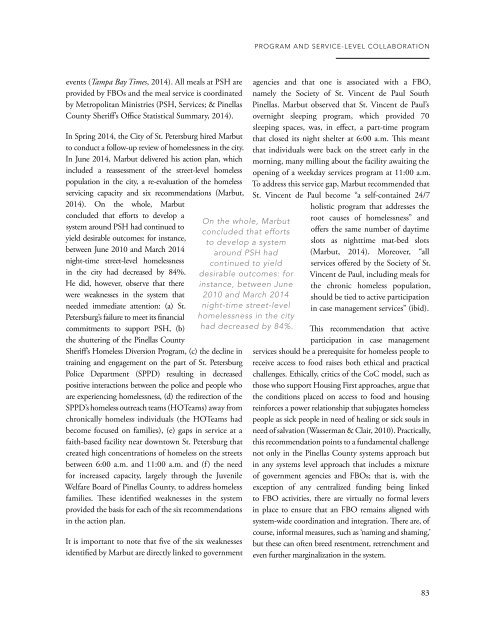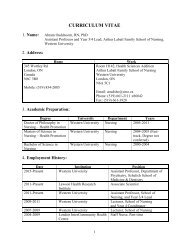EXPLORING EFFECTIVE SYSTEMS RESPONSES TO HOMELESSNESS
Systems%20Book%20-%20Web_1
Systems%20Book%20-%20Web_1
You also want an ePaper? Increase the reach of your titles
YUMPU automatically turns print PDFs into web optimized ePapers that Google loves.
PROGRAM AND SERVICE-LEVEL COLLABORATION<br />
events (Tampa Bay Times, 2014). All meals at PSH are<br />
provided by FBOs and the meal service is coordinated<br />
by Metropolitan Ministries (PSH, Services; & Pinellas<br />
County Sheriff’s Office Statistical Summary, 2014).<br />
In Spring 2014, the City of St. Petersburg hired Marbut<br />
to conduct a follow-up review of homelessness in the city.<br />
In June 2014, Marbut delivered his action plan, which<br />
included a reassessment of the street-level homeless<br />
population in the city, a re-evaluation of the homeless<br />
servicing capacity and six recommendations (Marbut,<br />
2014). On the whole, Marbut<br />
concluded that efforts to develop a<br />
system around PSH had continued to<br />
yield desirable outcomes: for instance,<br />
between June 2010 and March 2014<br />
night-time street-level homelessness<br />
in the city had decreased by 84%.<br />
He did, however, observe that there<br />
were weaknesses in the system that<br />
needed immediate attention: (a) St.<br />
Petersburg’s failure to meet its financial<br />
commitments to support PSH, (b)<br />
the shuttering of the Pinellas County<br />
Sheriff’s Homeless Diversion Program, (c) the decline in<br />
training and engagement on the part of St. Petersburg<br />
Police Department (SPPD) resulting in decreased<br />
positive interactions between the police and people who<br />
are experiencing homelessness, (d) the redirection of the<br />
SPPD’s homeless outreach teams (HOTeams) away from<br />
chronically homeless individuals (the HOTeams had<br />
become focused on families), (e) gaps in service at a<br />
faith-based facility near downtown St. Petersburg that<br />
created high concentrations of homeless on the streets<br />
between 6:00 a.m. and 11:00 a.m. and (f) the need<br />
for increased capacity, largely through the Juvenile<br />
Welfare Board of Pinellas County, to address homeless<br />
families. These identified weaknesses in the system<br />
provided the basis for each of the six recommendations<br />
in the action plan.<br />
It is important to note that five of the six weaknesses<br />
identified by Marbut are directly linked to government<br />
On the whole, Marbut<br />
concluded that efforts<br />
to develop a system<br />
around PSH had<br />
continued to yield<br />
desirable outcomes: for<br />
instance, between June<br />
2010 and March 2014<br />
night-time street-level<br />
homelessness in the city<br />
had decreased by 84%.<br />
agencies and that one is associated with a FBO,<br />
namely the Society of St. Vincent de Paul South<br />
Pinellas. Marbut observed that St. Vincent de Paul’s<br />
overnight sleeping program, which provided 70<br />
sleeping spaces, was, in effect, a part-time program<br />
that closed its night shelter at 6:00 a.m. This meant<br />
that individuals were back on the street early in the<br />
morning, many milling about the facility awaiting the<br />
opening of a weekday services program at 11:00 a.m.<br />
To address this service gap, Marbut recommended that<br />
St. Vincent de Paul become “a self-contained 24/7<br />
holistic program that addresses the<br />
root causes of homelessness” and<br />
offers the same number of daytime<br />
slots as nighttime mat-bed slots<br />
(Marbut, 2014). Moreover, “all<br />
services offered by the Society of St.<br />
Vincent de Paul, including meals for<br />
the chronic homeless population,<br />
should be tied to active participation<br />
in case management services” (ibid).<br />
This recommendation that active<br />
participation in case management<br />
services should be a prerequisite for homeless people to<br />
receive access to food raises both ethical and practical<br />
challenges. Ethically, critics of the CoC model, such as<br />
those who support Housing First approaches, argue that<br />
the conditions placed on access to food and housing<br />
reinforces a power relationship that subjugates homeless<br />
people as sick people in need of healing or sick souls in<br />
need of salvation (Wasserman & Clair, 2010). Practically,<br />
this recommendation points to a fundamental challenge<br />
not only in the Pinellas County systems approach but<br />
in any systems level approach that includes a mixture<br />
of government agencies and FBOs; that is, with the<br />
exception of any centralized funding being linked<br />
to FBO activities, there are virtually no formal levers<br />
in place to ensure that an FBO remains aligned with<br />
system-wide coordination and integration. There are, of<br />
course, informal measures, such as ‘naming and shaming,’<br />
but these can often breed resentment, retrenchment and<br />
even further marginalization in the system.<br />
83






